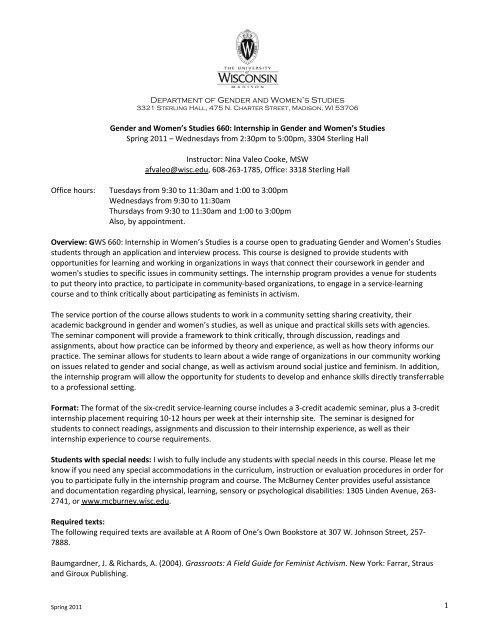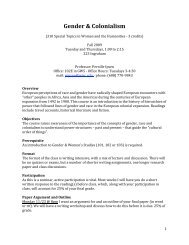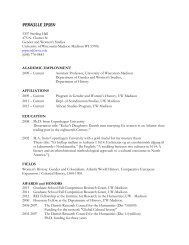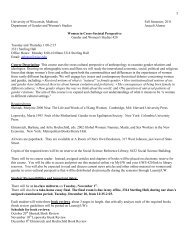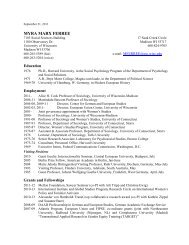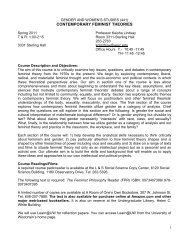Internship in Gender and Women's Studies Spring
Internship in Gender and Women's Studies Spring
Internship in Gender and Women's Studies Spring
You also want an ePaper? Increase the reach of your titles
YUMPU automatically turns print PDFs into web optimized ePapers that Google loves.
Department of <strong>Gender</strong> <strong>and</strong> Women’s <strong>Studies</strong><br />
3321 Sterl<strong>in</strong>g Hall, 475 N. Charter Street, Madison, WI 53706<br />
<strong>Gender</strong> <strong>and</strong> Women’s <strong>Studies</strong> 660: <strong>Internship</strong> <strong>in</strong> <strong>Gender</strong> <strong>and</strong> Women’s <strong>Studies</strong><br />
Spr<strong>in</strong>g 2011 – Wednesdays from 2:30pm to 5:00pm, 3304 Sterl<strong>in</strong>g Hall<br />
Instructor: N<strong>in</strong>a Valeo Cooke, MSW<br />
afvaleo@wisc.edu, 608‐263‐1785, Office: 3318 Sterl<strong>in</strong>g Hall<br />
Office hours:<br />
Tuesdays from 9:30 to 11:30am <strong>and</strong> 1:00 to 3:00pm<br />
Wednesdays from 9:30 to 11:30am<br />
Thursdays from 9:30 to 11:30am <strong>and</strong> 1:00 to 3:00pm<br />
Also, by appo<strong>in</strong>tment.<br />
Overview: GWS 660: <strong>Internship</strong> <strong>in</strong> Women’s <strong>Studies</strong> is a course open to graduat<strong>in</strong>g <strong>Gender</strong> <strong>and</strong> Women’s <strong>Studies</strong><br />
students through an application <strong>and</strong> <strong>in</strong>terview process. This course is designed to provide students with<br />
opportunities for learn<strong>in</strong>g <strong>and</strong> work<strong>in</strong>g <strong>in</strong> organizations <strong>in</strong> ways that connect their coursework <strong>in</strong> gender <strong>and</strong><br />
women's studies to specific issues <strong>in</strong> community sett<strong>in</strong>gs. The <strong>in</strong>ternship program provides a venue for students<br />
to put theory <strong>in</strong>to practice, to participate <strong>in</strong> community‐based organizations, to engage <strong>in</strong> a service‐learn<strong>in</strong>g<br />
course <strong>and</strong> to th<strong>in</strong>k critically about participat<strong>in</strong>g as fem<strong>in</strong>ists <strong>in</strong> activism.<br />
The service portion of the course allows students to work <strong>in</strong> a community sett<strong>in</strong>g shar<strong>in</strong>g creativity, their<br />
academic background <strong>in</strong> gender <strong>and</strong> women’s studies, as well as unique <strong>and</strong> practical skills sets with agencies.<br />
The sem<strong>in</strong>ar component will provide a framework to th<strong>in</strong>k critically, through discussion, read<strong>in</strong>gs <strong>and</strong><br />
assignments, about how practice can be <strong>in</strong>formed by theory <strong>and</strong> experience, as well as how theory <strong>in</strong>forms our<br />
practice. The sem<strong>in</strong>ar allows for students to learn about a wide range of organizations <strong>in</strong> our community work<strong>in</strong>g<br />
on issues related to gender <strong>and</strong> social change, as well as activism around social justice <strong>and</strong> fem<strong>in</strong>ism. In addition,<br />
the <strong>in</strong>ternship program will allow the opportunity for students to develop <strong>and</strong> enhance skills directly transferrable<br />
to a professional sett<strong>in</strong>g.<br />
Format: The format of the six‐credit service‐learn<strong>in</strong>g course <strong>in</strong>cludes a 3‐credit academic sem<strong>in</strong>ar, plus a 3‐credit<br />
<strong>in</strong>ternship placement requir<strong>in</strong>g 10‐12 hours per week at their <strong>in</strong>ternship site. The sem<strong>in</strong>ar is designed for<br />
students to connect read<strong>in</strong>gs, assignments <strong>and</strong> discussion to their <strong>in</strong>ternship experience, as well as their<br />
<strong>in</strong>ternship experience to course requirements.<br />
Students with special needs: I wish to fully <strong>in</strong>clude any students with special needs <strong>in</strong> this course. Please let me<br />
know if you need any special accommodations <strong>in</strong> the curriculum, <strong>in</strong>struction or evaluation procedures <strong>in</strong> order for<br />
you to participate fully <strong>in</strong> the <strong>in</strong>ternship program <strong>and</strong> course. The McBurney Center provides useful assistance<br />
<strong>and</strong> documentation regard<strong>in</strong>g physical, learn<strong>in</strong>g, sensory or psychological disabilities: 1305 L<strong>in</strong>den Avenue, 263‐<br />
2741, or www.mcburney.wisc.edu.<br />
Required texts:<br />
The follow<strong>in</strong>g required texts are available at A Room of One’s Own Bookstore at 307 W. Johnson Street, 257‐<br />
7888.<br />
Baumgardner, J. & Richards, A. (2004). Grassroots: A Field Guide for Fem<strong>in</strong>ist Activism. New York: Farrar, Straus<br />
<strong>and</strong> Giroux Publish<strong>in</strong>g.<br />
Spr<strong>in</strong>g 2011 1
Mart<strong>in</strong>, C. (2010). Do It Anyway: The New Generation of Activists. Boston: Beacon Press.<br />
Kristof, N. & WuDunn, S. (2009). Half the Sky: Turn<strong>in</strong>g Oppression Into Opportunity for Women Worldwide. New<br />
York: Knopf.<br />
E‐Reserve Course Read<strong>in</strong>gs: Required course read<strong>in</strong>gs are available electronically at Learn@UW.<br />
Evaluation:<br />
20 pts. Participation <strong>and</strong> attendance – evidence of prepar<strong>in</strong>g for class, thoughtful contributions, actively<br />
participat<strong>in</strong>g <strong>in</strong> the fem<strong>in</strong>ist learn<strong>in</strong>g community, <strong>and</strong> visit<strong>in</strong>g/host<strong>in</strong>g an <strong>in</strong>ternship exchange.<br />
15 pts. Weekly 1 to 2‐page analysis papers<br />
5 pts. Facilitat<strong>in</strong>g class discussion on assigned chapter <strong>in</strong> a selected text<br />
10 pts. Theory, Practice <strong>and</strong> Activism presentation<br />
15 pts. F<strong>in</strong>al project or paper: Due Wednesday, May 4 th<br />
35 pts. <strong>Internship</strong> work, <strong>in</strong>clud<strong>in</strong>g 10‐12 hours/week at your community agency <strong>and</strong> evaluations<br />
If you have questions or concerns about the course or evaluation, please speak with me first. If the issue is still<br />
not resolved, please speak with Jane Coll<strong>in</strong>s, Chair of <strong>Gender</strong> <strong>and</strong> Women’s <strong>Studies</strong>, or Christ<strong>in</strong>a Ewig, Associate<br />
Chair of <strong>Gender</strong> <strong>and</strong> Women’s <strong>Studies</strong>.<br />
Course Requirements:<br />
1. Complete 10‐12 hours per week at your <strong>in</strong>ternship site dur<strong>in</strong>g the 15 weeks of the semester <strong>in</strong><br />
compliance with the <strong>Internship</strong> Learn<strong>in</strong>g Contract. In addition, students will complete a record sheet<br />
detail<strong>in</strong>g activities <strong>and</strong> time logged. You are expected to beg<strong>in</strong> your <strong>in</strong>ternship the first week of classes<br />
beg<strong>in</strong>n<strong>in</strong>g on January 18 th .<br />
2. Attend, prepare, engage with the course materials <strong>and</strong> actively participate <strong>in</strong> the weekly sem<strong>in</strong>ar.<br />
3. Complete weekly analysis papers (see specific assignment by week attached to the syllabus).<br />
4. Facilitate class discussion on February 9 th or February 23 rd on an assigned chapter <strong>in</strong> course text.<br />
5. Visit another <strong>in</strong>ternship site AND host an <strong>in</strong>tern at your agency.<br />
6. Facilitate Theory, Practice <strong>and</strong> Activism Presentation on April 6 th , 13 th , 20 th or 27 th .<br />
7. Complete the f<strong>in</strong>al project or paper due on Wednesday, May 4 th .<br />
8. Meet with me, <strong>in</strong>dividually, as needed throughout the semester. Students are responsible to set the<br />
agenda <strong>and</strong> drop‐<strong>in</strong>/make appo<strong>in</strong>tment(s) as necessary.<br />
9. Complete mid‐semester evaluations, due March 15 th <strong>and</strong> f<strong>in</strong>al evaluations, due May 4 th .<br />
1. <strong>Internship</strong>: Each <strong>in</strong>tern is required to complete 10‐12 hours of work per week throughout the 15 weeks of the<br />
semester for a total of at least 150 hours, beg<strong>in</strong>n<strong>in</strong>g January 18 th <strong>and</strong> end<strong>in</strong>g May 6 th . This is <strong>in</strong> addition to<br />
any required tra<strong>in</strong><strong>in</strong>g.<br />
<strong>Internship</strong> Learn<strong>in</strong>g Contract: Students are required to complete the <strong>Internship</strong> Learn<strong>in</strong>g<br />
Contract with their <strong>in</strong>ternship supervisor before the semester beg<strong>in</strong>s. This contract is designed to<br />
identify <strong>and</strong> clarify the position description, the educational objectives, learn<strong>in</strong>g activities, as<br />
well as def<strong>in</strong>e the expectations supervision, evaluation <strong>and</strong> anticipated challenges. This contract<br />
serves to clarify the <strong>in</strong>tern’s role between the student, supervisor <strong>and</strong> <strong>in</strong>structor.<br />
Record Sheets: Interns are required to complete an accurate record sheet detail<strong>in</strong>g hours<br />
worked <strong>and</strong> activities. The <strong>in</strong>ternship supervisor, at mid‐semester <strong>and</strong> f<strong>in</strong>al evaluations, reviews<br />
<strong>and</strong> signs off on this record sheet. An example of a record sheet will be provided electronically.<br />
2. Participation: Students are expected to attend every class, actively participate, as well as be an active<br />
listener. Students are expected to come to class prepared to engage <strong>in</strong> discussion, <strong>in</strong>clud<strong>in</strong>g read<strong>in</strong>gs,<br />
assignments <strong>and</strong> relevant <strong>in</strong>ternship experiences. Do<strong>in</strong>g otherwise will negatively impact a student’s f<strong>in</strong>al<br />
grade.<br />
Spr<strong>in</strong>g 2011 2
3. Analysis Papers: Students are required to submit a typed, double‐spaced, 1 to 2‐page analysis paper at the<br />
beg<strong>in</strong>n<strong>in</strong>g of each sem<strong>in</strong>ar beg<strong>in</strong>n<strong>in</strong>g January 26 th . Electronic papers will NOT be accepted. To earn full credit,<br />
students need to demonstrate overall learn<strong>in</strong>g <strong>and</strong> underst<strong>and</strong><strong>in</strong>g. This requires students to th<strong>in</strong>k critically<br />
<strong>and</strong> engage with the assigned read<strong>in</strong>gs, as applicable, as well as make connections to experiences at their<br />
<strong>in</strong>ternship site <strong>in</strong> the analysis paper assigned for the week. Please see Learn@UW or h<strong>and</strong>out for analysis<br />
paper assignments.<br />
4. Discussion Leader: Dur<strong>in</strong>g the week of February 9 th or February 23 rd students will lead discussion on an<br />
assigned chapter <strong>in</strong> one of two selected books, Grassroots OR Do It Anyway. Facilitat<strong>in</strong>g class discussion will<br />
require a thorough underst<strong>and</strong><strong>in</strong>g of the material, as well as creative <strong>and</strong> unique ways to engage the class <strong>in</strong><br />
the material. Students will be expected to submit their notes/outl<strong>in</strong>e/discussion questions from their chapter.<br />
Th<strong>in</strong>k critically. Be creative.<br />
5. <strong>Internship</strong> Swap: Each <strong>in</strong>tern will schedule to visit another <strong>in</strong>tern at her <strong>in</strong>ternship site <strong>and</strong> host an <strong>in</strong>tern<br />
exchange dur<strong>in</strong>g the week of March 2 nd . A reflection paper on this experience will be due on March 9 th .<br />
Students are encouraged to visit a site different from their own. Ideally, <strong>in</strong>terns will host another <strong>in</strong>tern at<br />
their site. It may not be appropriate for <strong>in</strong>terns to visit some confidential location or places where<br />
confidentiality is crucial. In this case, the host <strong>in</strong>tern should th<strong>in</strong>k creatively of other ways to <strong>in</strong>troduce an<br />
<strong>in</strong>tern to her agency’s work dur<strong>in</strong>g the swap.<br />
The host <strong>in</strong>tern should:<br />
• Choose a time dur<strong>in</strong>g the week of March 2 nd for the visit<strong>in</strong>g <strong>in</strong>tern that will be <strong>in</strong>terest<strong>in</strong>g for the<br />
visit, but not disruptive to other agency members, projects, or confidentiality.<br />
• Confirm visit with your supervisor.<br />
• Prepare for the visit – compile relevant agency brochures, a copy of your “Agency Assessment”<br />
paper, plan ways to help the visit<strong>in</strong>g <strong>in</strong>tern get a feel for the agency <strong>and</strong> your work <strong>in</strong> your<br />
<strong>in</strong>ternship.<br />
• Provide tips on gett<strong>in</strong>g to the agency, transportation, check<strong>in</strong>g <strong>in</strong>, what time to be expected, etc…<br />
The visit<strong>in</strong>g <strong>in</strong>tern should:<br />
• Confirm how to get to the agency <strong>and</strong> what time you are expected<br />
• Demonstrate <strong>in</strong>quiry <strong>and</strong> curiosity <strong>in</strong> the agency, supervisor, <strong>and</strong> agency’s work. Thank anyone who<br />
helped coord<strong>in</strong>ate the visit.<br />
• Compile a list of questions to further your underst<strong>and</strong><strong>in</strong>g of the agency.<br />
• Th<strong>in</strong>k of way that you can be supportive to the <strong>in</strong>tern at this agency now <strong>and</strong> throughout the<br />
semester.<br />
• Complete analysis paper reflect<strong>in</strong>g on the visit due on March 9 th .<br />
6. Theory, Practice <strong>and</strong> Activism Presentation: Students will facilitate a 20‐m<strong>in</strong>ute presentation that <strong>in</strong>cludes<br />
both <strong>in</strong>struction <strong>and</strong> facilitat<strong>in</strong>g discussion that will engage your peers on an issue related to your agency’s<br />
work <strong>and</strong> activism as it relates to gender <strong>and</strong> women’s studies on April 6 th , 13 th , 20 th or 27 th . This is an<br />
opportunity to teach about the activism that you have been work<strong>in</strong>g on at your agency <strong>and</strong> encourage others<br />
to become <strong>in</strong>spired on the issue.<br />
It is expected that presenters will connect theory <strong>and</strong> practice as it relates to your <strong>in</strong>ternship work. In your<br />
presentation, you will need to 1) prepare your classmates <strong>in</strong> advance through read<strong>in</strong>gs or activities, 2)<br />
illustrate the need for action on this issue, 3) teach a skill or concept, which will further underst<strong>and</strong><strong>in</strong>g issues<br />
related to your agency <strong>and</strong> 3) facilitate discussion which effectively engages your audience.<br />
Students will assign 1‐2 read<strong>in</strong>gs to prepare the class for their presentation. Read<strong>in</strong>gs are due to me at least<br />
one week BEFORE your presentation.<br />
Spr<strong>in</strong>g 2011 3
Students are encouraged to meet with me to discuss your presentation at any time. Th<strong>in</strong>k critically about<br />
what you want your audience to leave with; teach <strong>and</strong> facilitate accord<strong>in</strong>gly. Be creative <strong>and</strong> have fun!<br />
7. F<strong>in</strong>al Project or Paper: Students can choose between complet<strong>in</strong>g a f<strong>in</strong>al project or paper for their f<strong>in</strong>al<br />
assessment. Students are encouraged to meet with me to discuss their ideas for their project or paper. The<br />
f<strong>in</strong>al project or paper is due at the beg<strong>in</strong>n<strong>in</strong>g of class on Wednesday, May 4 th .<br />
The project requires that students create a project <strong>in</strong> partnership with their agency. While there is much<br />
flexibility <strong>in</strong> the project, the project should 1) serve the agency <strong>in</strong> some way <strong>and</strong> 2) be motivated by social<br />
change <strong>and</strong>/or social justice <strong>and</strong> 3) demonstrate fem<strong>in</strong>ist activism. Examples could <strong>in</strong>clude: organiz<strong>in</strong>g <strong>and</strong><br />
implement<strong>in</strong>g an event or fundraiser, design<strong>in</strong>g a website, creat<strong>in</strong>g <strong>and</strong> facilitat<strong>in</strong>g a presentation or<br />
workshop, creat<strong>in</strong>g a newsletter or pamphlet…<br />
If students choose this option, they will need to write a 5 to 7‐page analysis of the project. References are not<br />
required, but encouraged where applicable. Issues to be addressed would <strong>in</strong>clude: how was the project<br />
identified, what need does the project serve, how will the agency <strong>and</strong>/or their clients be served, how<br />
successful was the implementation of the project, how this projects contributes to fem<strong>in</strong>ist activism, etc…<br />
The research paper requires that students write a 10 to 15‐page comprehensive research paper address<strong>in</strong>g an<br />
issue from a social justice perspective core to the work that the <strong>in</strong>tern is do<strong>in</strong>g at their community‐based site.<br />
In addition, this paper must address how activism can help address this issue. The research paper must be<br />
typed, double‐spaced, with at least 5 academic sources <strong>and</strong> <strong>in</strong>clude a bibliography.<br />
8. Meet <strong>in</strong>dividually with me at least once dur<strong>in</strong>g the semester, more frequently as needed, to discuss<br />
<strong>in</strong>ternship progress, theory, practice <strong>and</strong> activism presentation, direction for the f<strong>in</strong>al project or research<br />
paper, as well as other issues as they may arise. Students are responsible for sett<strong>in</strong>g the agenda <strong>and</strong><br />
“runn<strong>in</strong>g” the meet<strong>in</strong>g. I am very open <strong>and</strong> available to discussion. It is your responsibility to seize this<br />
opportunity as you see fit to maximize your learn<strong>in</strong>g <strong>and</strong> approach challenges <strong>in</strong> a proactive, solution‐focused<br />
way.<br />
9. Evaluation: Students <strong>and</strong> supervisors will complete evaluations at mid‐semester <strong>and</strong> at the end of the<br />
semester. Students will evaluate their own performance. Supervisors will evaluate the <strong>in</strong>tern’s performance.<br />
Students <strong>and</strong> supervisors will review <strong>and</strong> compare the mid‐semester evaluations. Mid‐semester evaluations<br />
will be due on Wednesday, March 9 th . F<strong>in</strong>al evaluations will be due on Wednesday, May 4 th at the<br />
beg<strong>in</strong>n<strong>in</strong>g of class.<br />
Spr<strong>in</strong>g 2011 4
GWS 660: <strong>Internship</strong> <strong>in</strong> <strong>Gender</strong> <strong>and</strong> Women’s <strong>Studies</strong> – Spr<strong>in</strong>g 2011<br />
Sem<strong>in</strong>ar Topics, Read<strong>in</strong>gs <strong>and</strong> Deadl<strong>in</strong>es<br />
Week 1 – January 19 th : Com<strong>in</strong>g Together <strong>and</strong> Div<strong>in</strong>g In<br />
Introductions<br />
Mak<strong>in</strong>g the Most of Your <strong>Internship</strong> – A panel of former <strong>Gender</strong> <strong>and</strong> Women’s <strong>Studies</strong> <strong>in</strong>terns will jo<strong>in</strong> us<br />
to share their experiences as <strong>in</strong>terns, what they learned, how the <strong>in</strong>ternship shaped their education<br />
<strong>and</strong>/or career paths, how their <strong>in</strong>ternship experience <strong>in</strong>forms what they do now.<br />
Week 2 – January 26 th : Our Classroom, Our Community: Connect<strong>in</strong>g the Theory to Our Practice<br />
Analysis paper due: The Interview Process<br />
hooks, bell. (July/August, 1992). Out of the Academy <strong>and</strong> Into the Streets. Ms. Magaz<strong>in</strong>e. 80‐82.<br />
Ayanna, N. (Spr<strong>in</strong>g, 2007). Transform the World: What You Can Do With a Degree <strong>in</strong> Women’s <strong>Studies</strong>.<br />
Ms. Magaz<strong>in</strong>e. 65‐66.<br />
Zernike, K. (2010, January 3). Mak<strong>in</strong>g College ‘Relevant.’ The New York Times. Retrieved from<br />
www.nyt.com.<br />
Guy‐Sheftall, B. & Thornton Dill, B. (Spr<strong>in</strong>g 2009). Forty Years of Women’s <strong>Studies</strong>. Ms. Magaz<strong>in</strong>e. 56‐57,<br />
65‐67.<br />
Gilbert, M. & Cameh, C. (2002). Build<strong>in</strong>g Fem<strong>in</strong>ist Educational Alliance <strong>in</strong> an Urban Community. In Bojar,<br />
K. & Naples, N. (Eds.). Teach<strong>in</strong>g Fem<strong>in</strong>ist Activism: Strategies From the Field. 185‐206. New York:<br />
Routledge.<br />
Trigg, M. & Bailliet, B. (2000). Learn<strong>in</strong>g Across Boundaries: Women’s <strong>Studies</strong>, Praxis, <strong>and</strong> Community<br />
Service. Balliet, B. & Hefferman, K. (Eds.). In the Practice of Change: Concepts <strong>and</strong> Models for Service‐<br />
Learn<strong>in</strong>g <strong>in</strong> Women’s <strong>Studies</strong>. 87‐101. Wash<strong>in</strong>gton D.C.: American Association for Higher Education.<br />
Gilbert, M. (2000). Educated <strong>in</strong> Agency: Student Reflection on the Fem<strong>in</strong>ist Service Learn<strong>in</strong>g Classroom.<br />
Balliet, B. & Hefferman, K. (Eds.). In The Practice of Change: Concepts <strong>and</strong> Models for Service‐Learn<strong>in</strong>g <strong>in</strong><br />
Women’s <strong>Studies</strong>. 117‐138. Wash<strong>in</strong>gton D.C.: American Association for Higher Education.<br />
Week 3 – February 2 nd : Community Service Learn<strong>in</strong>g – What we need to consider<br />
Analysis paper due: Service Learn<strong>in</strong>g, Personally<br />
Shih, G. (2009, August 9). Unpaid Work, but They Pay for Privilege. The New York Times. Retrieved from<br />
www.nyt.com.<br />
Lee, J. (2008, August 10). Crucial Unpaid <strong>Internship</strong>s Increas<strong>in</strong>gly Separate the Haves From the Have‐<br />
Nots. The New York Times. Retrieved from www.nyt.com.<br />
Greenhouse, S. (2010, April 2). Growth of Unpaid <strong>Internship</strong> May Be Illegal, Officials Say. The New York<br />
Times. Retrieved from www.nyt.com.<br />
Kamentz, A. (May 30, 2006). Take This <strong>Internship</strong> <strong>and</strong> Shove It. New York Times.<br />
Belk<strong>in</strong>, L. (January 6, 2008). Who Will You Be This Summer. New York Times.<br />
Spr<strong>in</strong>g 2011 5
Duggar, K. (2008). Introduction: Women’s <strong>Studies</strong> Service Learn<strong>in</strong>g. In Duggar, K. (Ed.). H<strong>and</strong>book on<br />
Service Learn<strong>in</strong>g <strong>in</strong> Women’s <strong>Studies</strong> <strong>and</strong> the Discipl<strong>in</strong>es. 1‐4. Towson: Institute for Research on Women.<br />
Walker, T. (2000). A Fem<strong>in</strong>ist Challenge to Community Service: A Call to Politicize Service‐Learn<strong>in</strong>g. In<br />
Balliet, B. & Hefferman, K. (Eds.). The Practice of Change: Concepts <strong>and</strong> Models for Service‐Learn<strong>in</strong>g <strong>in</strong><br />
Women’s <strong>Studies</strong>. 25‐37. Wash<strong>in</strong>gton D.C.: American Association for Higher Education.<br />
Kivel, P. (2007). Social Service or Social Change. In Incite! Women of Color Aga<strong>in</strong>st Violence. (Eds.). The<br />
Revolution Will Not Be Funded: Beyond the Non‐Profit Industrial Complex. 130‐149. Cambridge: South<br />
End Press.<br />
Baumgardner, J. & Richards, A. (2004). Grassroots: A Field Guide for Fem<strong>in</strong>ist Activism. New York: Farrar,<br />
Straus <strong>and</strong> Giroux Publish<strong>in</strong>g.<br />
Introduction (xi‐xvi)<br />
Prologue: Portrait of an Activist (xvii‐xxv)<br />
Chapter 1: Why the World Needs Another Advice Book (3‐24)<br />
Week 4 – February 9 th : Fem<strong>in</strong>ist Activism<br />
Analysis paper due: What is Fem<strong>in</strong>ist Activism<br />
Clark, J. (April 18, 2005). An Activism of One’s Own. In These Times. (10).<br />
Baumgardner, J. & Richards, A. (2004). Grassroots: A Field Guide for Fem<strong>in</strong>ist Activism. New York: Farrar,<br />
Straus <strong>and</strong> Giroux Publish<strong>in</strong>g.<br />
*Chapter 2: Of M<strong>in</strong>or Importance<br />
*Chapter 3: Rebels With Causes<br />
*Chapter 4: The Real World<br />
*Chapter 5: The Activist at Work<br />
*Chapter 6: Creat<strong>in</strong>g Activism<br />
*Chapter 7: The Revolutionary Next Door<br />
Epilogue: A Day <strong>in</strong> the Life of An Activist<br />
Appendix A: A Glossary of the Most Common Forms of Activism<br />
Appendix B: Chapter‐by‐Chapter Resource Guide<br />
*Student led discussion: Students will facilitate discussion on these chapters.<br />
Week 5 – February 16 th : Fem<strong>in</strong>ist Activism <strong>in</strong> Practice<br />
Analysis paper due: Your Activist Timel<strong>in</strong>e<br />
hooks, bell. (2000). Visionary Fem<strong>in</strong>ism. Fem<strong>in</strong>ism is for Everybody. 110‐118. Cambridge: South End Press.<br />
Mendieta, E. (February 2006). Angela Davis’ Advice to the Movement. From In These Times. 60.<br />
F<strong>in</strong>ley, L. & Str<strong>in</strong>ger, E.R. (2010). Beyond Burn<strong>in</strong>g Bras: Fem<strong>in</strong>ist Activism for Everyone. ix – xv. Santa<br />
Barbara: Praeger Publish<strong>in</strong>g.<br />
Enke, Anne. (2007). “K<strong>in</strong>d of Like Mecca:” Playgrounds, Players <strong>and</strong> Women’s Movement. F<strong>in</strong>d<strong>in</strong>g the<br />
Movement: Sexuality, Contested Space <strong>and</strong> Fem<strong>in</strong>ist Activism. 105‐139. Durham: Duke University Press.<br />
Talk<strong>in</strong>g Back: Activism <strong>and</strong> Pop Culture. (2006). Jervis, L. & Zeisler, A. (Eds.). In Bitchfest. 328‐343. New<br />
York: Farrar, Straus <strong>and</strong> Giroux.<br />
Richards, A. & Schnall, M. Cyberfem<strong>in</strong>ism. Morgan, Rob<strong>in</strong> (Ed.). (2003). In Sisterhood is Forever: the<br />
Woman’s Anthology for the New Millennium. 517‐525. New York: Wash<strong>in</strong>gton Square Press.<br />
Spr<strong>in</strong>g 2011 6
Wolman, D. (November 2008). Facebook Egypt. Wired Magaz<strong>in</strong>e. 212‐217, 244.<br />
Shapiro, S. (2009, January 25). Revolution, Facebook Style. The New York Times. Retrieved from<br />
www.nyt.com.<br />
Solomon, D. (2009, November 15). Fourth Wave Fem<strong>in</strong>ism. The New York Times. Retrieved from<br />
www.nyt.com.<br />
Week 6 – February 23 rd : The New Generation of Activists<br />
Analysis paper due: Agency Assessment<br />
** Please submit TWO copies of this analysis paper. One copy will be shared with the <strong>in</strong>tern that will<br />
be visit<strong>in</strong>g your agency.<br />
Mart<strong>in</strong>, Courtney. (2010). Do It Anyway: The New Generation of Activists. Boston: Beacon Press.<br />
Introduction<br />
*Chapter 1: “I Am Hungry for One Good Th<strong>in</strong>g I Can Do”<br />
*Chapter 2: An Altar Boy With a Gun<br />
*Chapter 3: Recovery Mission<br />
*Chapter 4: The Boxer<br />
*Chapter 5: It A<strong>in</strong>’t Easy Be<strong>in</strong>g Green<br />
*Chapter 6: Class Action<br />
*Chapter 7: Power Becomes Her<br />
*Chapter 8: Born to Teach<br />
Conclusion: Good Failure<br />
*Student led discussion: Students will facilitate discussion on these chapters.<br />
Week 7 – March 2 nd : *** NO class this week. ***<br />
<strong>Internship</strong> exchange – visit another <strong>in</strong>tern at her <strong>in</strong>ternship site<br />
Individual meet<strong>in</strong>gs with N<strong>in</strong>a: Check‐<strong>in</strong> <strong>and</strong> th<strong>in</strong>k<strong>in</strong>g forward on f<strong>in</strong>al project/paper.<br />
NO analysis paper is due this week.<br />
Week 8 – March 9 th : Women Organiz<strong>in</strong>g, Women’s Organizations <strong>and</strong> Organiz<strong>in</strong>g on Women’s Issues<br />
Mid‐semester evaluations are due<br />
Analysis paper due: <strong>Internship</strong> Exchange<br />
Reagon, B. J. (1983). Coalition Politics: Turn<strong>in</strong>g the Century. Smith, B. (Ed.) In Home Girls: A Black Fem<strong>in</strong>ist<br />
Anthology. 343‐352. New Bruswick: Rutgers University Press.<br />
F<strong>in</strong>ley, L. & Str<strong>in</strong>ger, E.R. (2010). Beyond Burn<strong>in</strong>g Bras: Fem<strong>in</strong>ist Activism for Everyone. 1‐40. Santa<br />
Barbara: Praeger Publish<strong>in</strong>g.<br />
Kravetz, D. (2004). Tales from the Trenches. 49‐67, 117‐143, 183‐204. Oxford: University Press of<br />
America.<br />
Bobel, C. (2010). New Blood: Third‐Wave Fem<strong>in</strong>ism <strong>and</strong> the Politics of Menstruation. 42‐64. New Jersey:<br />
Rutgers University Press.<br />
Baumgardner, J. & Richards, A. Who’s the Next Gloria The Quest for the Third Wave Superleader.<br />
Dicker, R. & Piepmeier, A. (Eds.). (2003). In Catch<strong>in</strong>g a Wave. 159‐170. Boston: Northeastern University<br />
Press.<br />
*** SPRING BREAK ***<br />
Spr<strong>in</strong>g 2011 7
Week 9 – March 23 rd : Organiz<strong>in</strong>g <strong>and</strong> Activism – Diverse <strong>and</strong> Global Perspectives<br />
Analysis paper due: Community Impact – Why Our Work Matters<br />
Kristof, N. & WuDunn, S. (2009). Half the Sky: Turn<strong>in</strong>g Oppression Into Opportunity for Women<br />
Worldwide. Chapters 1 – 13. New York: Knopf.<br />
Week 10 – March 30 th : Social Change, Social Justice <strong>in</strong> 2009 – What you can do<br />
Analysis paper due: Outside Look<strong>in</strong>g In, Inside Look<strong>in</strong>g Out<br />
Kristof, N. & WuDunn, S. (2009). Half the Sky: Turn<strong>in</strong>g Oppression Into Opportunity for Women<br />
Worldwide. Chapter 14. New York: Knopf.<br />
Fisher, D. (2006). Where Do We Go From Here: The Future of Grassroots Politics <strong>in</strong> America. Activism,<br />
Inc. 107‐114. Stanford: Stanford University Press.<br />
Berger, D., Boud<strong>in</strong>, C. <strong>and</strong> Farrow, K. (2005). 175‐234. Letters From Young Activists. New York : Nation<br />
Books.<br />
Week 11 – April 6 th : Student Presentations<br />
Analysis paper due: What Does Social Change <strong>and</strong> Social Justice Look Like Today<br />
Presentations 1 – 4<br />
Week 12 – April 13 th : Student Presentations<br />
Analysis paper due: Inform<strong>in</strong>g Our Practice<br />
Presentation 5 – 8<br />
Week 13 – April 20 th : Student Presentations<br />
Analysis paper due: Cont<strong>in</strong>u<strong>in</strong>g Fem<strong>in</strong>ist Activism – What Comes Next<br />
Presentations 9 – 12<br />
Week 14 – April 27 th : Student Presentations<br />
Analysis paper due: Letter to Future Interns<br />
Presentations 12 – 16<br />
Week 15 – May 4 th : What Comes Next<br />
F<strong>in</strong>al semester evaluations are due<br />
<strong>Internship</strong> project OR research paper due at 2:30pm<br />
Project summaries<br />
Clos<strong>in</strong>g thoughts<br />
Spr<strong>in</strong>g 2011 8


